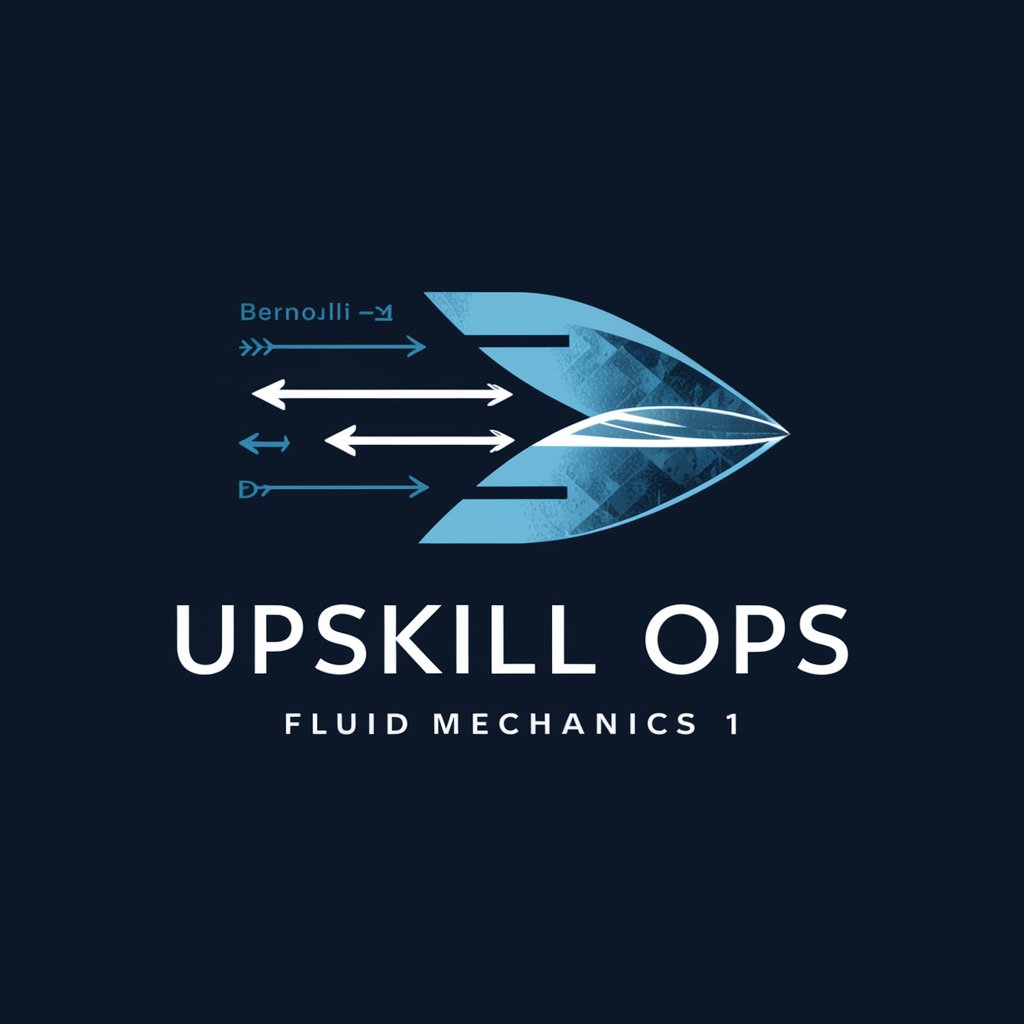Upskill Ops Fluid Mechanics 1 - Fluid Mechanics Insights

Welcome to Upskill Ops Fluid Mechanics 1, your guide to mastering fluid mechanics!
Empowering fluid mechanics learning with AI-driven insights and historical context.
Explain the significance of Bernoulli's principle in modern fluid dynamics.
Describe a landmark experiment in the history of fluid mechanics.
What are the key differences between laminar and turbulent flow?
Discuss the contributions of Isaac Newton to fluid mechanics.
Get Embed Code
Introduction to Upskill Ops Fluid Mechanics 1
Upskill Ops Fluid Mechanics 1 is designed as an advanced informational and educational tool, focusing on the principles and applications of fluid mechanics. Its primary purpose is to facilitate a deeper understanding of fluid dynamics, a branch of physics concerned with the study of fluids (liquids, gases, and plasmas) and the forces acting upon them. This tool integrates a comprehensive overview of historical developments in fluid mechanics with current concepts and applications, enabling users to connect past innovations with modern engineering challenges. It serves as a bridge between theoretical knowledge and practical application, providing insights into the mechanics of fluids in various contexts, such as aerospace, civil engineering, and environmental science. Examples of its functionality include detailed explanations of Bernoulli's principle in the design of aircraft wings, analysis of fluid flow in pipe systems for civil engineering projects, and the study of ocean currents in climate modeling. Powered by ChatGPT-4o。

Main Functions of Upskill Ops Fluid Mechanics 1
Educational Insights
Example
Explaining the principle of conservation of mass in fluid dynamics through the continuity equation.
Scenario
Used by engineering students to understand how mass flow rate remains constant in a closed system, aiding in the design of efficient piping systems for water distribution.
Historical Context
Example
Detailing the development of the Navier-Stokes equations and their impact on the study of fluid flow.
Scenario
Assists researchers in appreciating the evolution of fluid mechanics theories, fostering a deeper understanding of contemporary fluid dynamics models.
Practical Application Guidance
Example
Guidance on applying fluid dynamics principles to design more efficient wind turbines.
Scenario
Beneficial for renewable energy engineers looking to optimize turbine blade shapes for maximum energy generation with minimal environmental impact.
Ideal Users of Upskill Ops Fluid Mechanics 1 Services
Engineering Students
Students pursuing degrees in mechanical, aerospace, civil, and environmental engineering can leverage this tool to enhance their understanding of fluid mechanics principles, preparing them for careers that require expertise in fluid dynamics.
Research Scientists
Professionals in scientific research focusing on fluid dynamics, weather patterns, oceanography, and related fields will find the tool invaluable for accessing historical insights and current methodologies, aiding in the development of new theories and experiments.
Industry Professionals
Engineers and designers in industries such as automotive, aerospace, and renewable energy can use the tool to apply fluid mechanics concepts to solve practical problems, design innovative solutions, and improve product performance.

How to Use Upskill Ops Fluid Mechanics 1
1
Start your journey at yeschat.ai to access a free trial of Upskill Ops Fluid Mechanics 1, no login or ChatGPT Plus subscription required.
2
Choose 'Fluid Mechanics' from the available subjects to focus your learning or inquiry on fluid dynamics and related concepts.
3
Input your specific questions or topics of interest related to fluid mechanics to receive tailored, in-depth explanations and insights.
4
Utilize the historical context feature to explore the evolution of fluid mechanics theories, experiments, and figures that have shaped the field.
5
Engage with the provided information to deepen your understanding, applying the insights to academic research, professional projects, or personal curiosity.
Try other advanced and practical GPTs
Real Wallstreet Expert
Empowering Your Financial Decisions with AI

Personalized Learning Companion
Elevate Learning with AI Personalization

Nonprofit Navigator
Empowering Nonprofits with AI

WAHOO
Empowering Your Shopify Success with AI

Founder's Tech Titan
Empowering Startups with AI-Driven Strategies

Find a Movie to See Tonight with MeGusta.ai
Discover Cinema with AI Insight

VisionBoard Creator
Visualize Goals with AI

StratInsight Pro:Business Strategy Analysis Expert
AI-powered Strategy Insights at Your Fingertips

You Tube Tags
Elevate Your Content with AI-Driven Tags

Mestre do Thumbnail (Miniaturas p/ Vídeos)
Crafting Click-Worthy Thumbnails with AI

Corrija Erros de Ortografia
Enhance your writing with AI-powered precision

OttO Sonnet and a Haiku
Crafting Your Thoughts into Poetry

Frequently Asked Questions About Upskill Ops Fluid Mechanics 1
What makes Upskill Ops Fluid Mechanics 1 unique?
This tool uniquely integrates contemporary fluid mechanics concepts with historical insights, offering users a comprehensive understanding of both the current state and evolution of the field.
Can I use Upskill Ops Fluid Mechanics 1 for academic research?
Absolutely. The tool is designed to support academic research by providing detailed explanations, historical context, and insights into fluid mechanics that can enhance the quality of research papers and projects.
How does the historical context feature work?
The historical context feature provides users with background information on key discoveries, experiments, and figures in fluid mechanics, enriching their understanding of how current principles came to be.
Is Upskill Ops Fluid Mechanics 1 suitable for professionals in the field?
Yes, professionals will find Upskill Ops Fluid Mechanics 1 invaluable for brushing up on theory, exploring new developments, and understanding the historical evolution of practices and principles in their field.
How can beginners get the most out of this tool?
Beginners should focus on foundational concepts in fluid mechanics before exploring more complex topics and historical contexts, using the tool's tailored insights to build a strong knowledge base.
